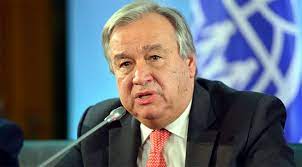The UN Secretary-General Antonio Guterres has warned the world about its continuous slides towards a wider war as the risk of further escalation in the Russia-Ukraine conflict rises every other day. While addressing the 193-member UN General Assembly, Guterres echoed his concerns regarding the drastic effects of the Russian invasion of Ukraine, which inflicted untold suffering on the Ukrainian people with profound global implications. Accoridng to the UN Chief, the world was walking into a wider conflict with wide-open eyes instead of somnambulism.
Global peace and tranquility have significantly declined during the past decade due to a renewed escalation in the international rivalry between the major powers. Realistically, the forced annexure of Creamia by the Russian Federation was the beginning point of the current US-Russia tussle. At the same time, American rapprochement toward Taiwan and the four nations’ Quad Security Dialogue were other reasons for contention between China and the western bloc. Besides these two newest warzones, all times war theaters and persistent unresolved global issues including Palestine, Jammu and Kashmir, Afghanistan, Haiti, Syrian, Yemeni, and Lybian crises, North Korea Nuclear dispute, and unending communal and terror insurgencies in the Sahel region remained centers of violence and regional conflict along with continuous battlegrounds for major contenders including the US and NATO, Russia and China.
At the time, the nearly year-long conflict in Ukraine has been intensifying in recent weeks with fierce battles between the Ukrainian military and Russian forces for control of important strategic locations in eastern Ukraine. Russia has deployed its heavily armed fresh troops into the war. The western allies also accelerated their provision of modern weapons including main battle tanks and air crafts to support Ukraine’s war efforts against Moscow. Over the past year, the Ukrainian conflict remained inconclusive and both sides suffered significant human and economic losses, while every other day increases the chances of a wider war and nuclear conflict between the challengers. Similarly, the situation in the Indo-Pacific region, the Taiwan Strait, and Korean Peninsula are seriously fragile and any misstep of belligerent nations can bring disaster to the region.
Meanwhile, Indian hegemonism and unimaginable atrocities and human rights violations in Indian Illegally Occupied Jammu and Kashmir (IIOJK) had brought South Asia to the brink of a nuclear conflict because New Delhi persistently denied Kashmiris’ right to self-determination over the past decades. Whereas the unresolved Palestine dispute and Israel intensified settlers’ colonialism in Gaza and West Bank is all time risk to peace and stability in the Middle East region.
The UN Chief has precisely described the risks to global peace and stability, however, he did not apprise the world about the helplessness and impotence of his forum which fell prey to the selfishness of major powers. Realistically, the United Nations and its executive arm, the UN Security Council failed to implement their decisions on their member nations since the very existence of the New York-based world organization. Ironically, the mechanism that was formed to prevent war had been used by the powerful nations to wage war agaisnt opponents, while weak nations could not get their basic rights due to injustice and bias. In fact, the evaluation of issues is not sufficient, the UN Chief must work toward cessation of membership of those nations who did not cooperate and disrespected UN decisions in the past, so every arrogant gets penalized and others start respecting the UN charter. This is the sole idea for maintaining peace and ensuring law in the universe, otherwise, the UN would earn a disgrace every other day.







